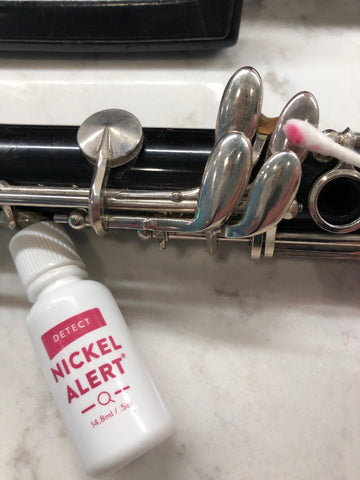Nickel Allergy and Musical Instruments
Is it possible to be allergic to a musical instrument?
- Many musical instruments may contain enough nickel to create problems for nickel allergy sufferers.
- Consider testing musical instruments with a dimethylyglyoxime test such as Nickel Alert® prior to purchase if nickel allergy is a concern.
- Metal instruments and their parts/pieces may contain nickel or have nickel plating. For example, most student-grade model flutes and clarinets are made with nickel. The higher grade flutes and clarinets tend to be made of silver which may contain nickel.
 I have nickel allergy, how do I avoid it in my musical instruments?
I have nickel allergy, how do I avoid it in my musical instruments?
- To limit exposure to nickel, ask prior to purchasing if the instrument contains nickel, nickel plate, or copper/nickel alloy in the areas that will be in prolonged contact with the skin. If unsure, question sales personnel or manufacturers. You may be allowed test items with Nickel Alert prior to purchase.
- The parts of musical instruments with which you have ongoing direct contact should be tested for nickel content. Wash mouthpieces after testing.
- Nickel Alert is safe to use as directed on any metal item.
- Consider testing: Keys, mouthpieces, guitar and cello strings, and tuners.
~Did you know?
Perspiration from heat and humidity aid the transfer of nickel salts—the true culprit of nickel allergy—and increases the symptoms of the allergy.
Copyright © 2003-2025 Athena Allergy Inc. All rights reserved
